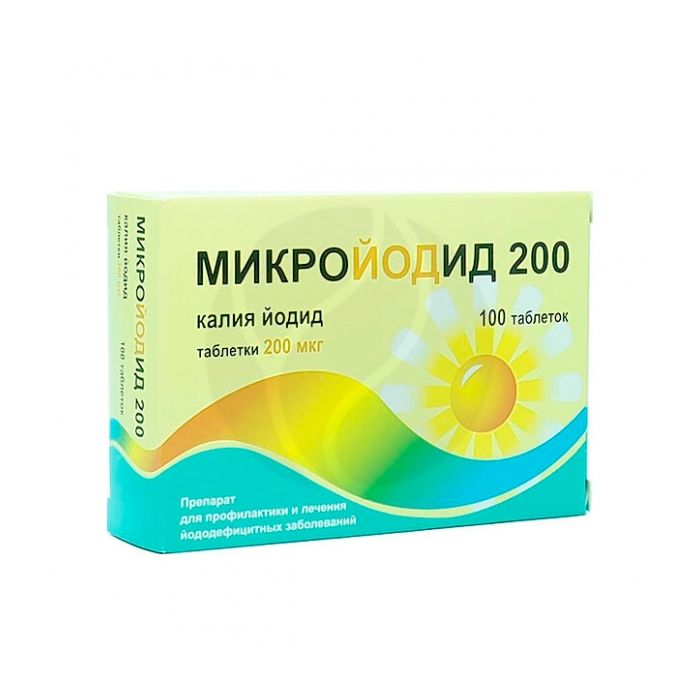Microiodide 200 tablets 200mkg, No. 100
Expiration Date: 05/2027
Russian Pharmacy name:
Микройодид 200 таблетки 200мкг, №100
Prevention and treatment of endemic goiter. Prevention of goiter recurrence during complex treatment with thyroid hormone preparations.
Individual. The daily dose in terms of iodine is 50-100 mcg for children, and 100-200 mcg for adolescents and adults.
potassium iodide 130.5 \ 262 mcg
Severe hyperthyroidism, latent hyperthyroidism (when used in doses exceeding 150 mcg / day), toxic adenoma, nodular or diffuse toxic goiter (when used in doses of 300-1000 mcg / day), dermatitis herpetiformis (Duhring's disease), pregnancy and breastfeeding (when used in doses of 1-2 mg / day), hypersensitivity to iodine preparations.
pharmachologic effect
A product containing inorganic iodine. When iodides enter the epithelial cells of the thyroid follicle under the influence of the enzyme iodide peroxidase, iodine is oxidized to form elemental iodine, which is incorporated into the tyrosine molecule. In this case, one part of the tyrosine radicals in thyroglobulin is iodized. Iodinated tyrosine radicals condense into thyronines, the main of which are thyroxine (T4) and triiodothyronine (T3). The formed complex of thyronine and thyroglobulin is released as a deposited form of thyroid hormone into the colloid of the follicle and remains in this state for several days or weeks. With iodine deficiency, this process is disrupted. Potassium iodide, compensating for iodine deficiency, helps to restore the impaired synthesis of thyroid hormones.
With a normal iodine content in the environment, under the influence of an excess of iodides, the biosynthesis of thyroid hormones is inhibited, their release from thyroglobulin, the sensitivity of the thyroid gland to thyroid-stimulating hormone of the pituitary gland decreases and its secretion by the pituitary gland is blocked.
Pharmacokinetics
When taken orally, it is rapidly absorbed from the gastrointestinal tract. It is widely distributed in all tissues and body fluids.
Indications of the active substances of the drug Mikroyodid 100
Prevention and treatment of endemic goiter. Prevention of goiter recurrence during complex treatment with thyroid hormone preparations.
Dosage regimen
Individual. The daily dose in terms of iodine is 50-100 mcg for children, and 100-200 mcg for adolescents and adults.
Side effect
Manifestations of iodism: edema of the nasal mucosa, urticaria, Quincke's edema, eosinophilia, shock; also possible tachycardia, irritability, sleep disturbances, increased sweating, diarrhea (in patients over 40); in some cases, when used in doses exceeding 300-1000 mcg / day, hyperthyroidism may develop (especially in elderly patients, in the presence of nodular or diffuse toxic goiter); with high-dose therapy (more than 1 mg / day), goiter caused by iodine and, accordingly, hypothyroidism may develop.
Contraindications for use
Severe hyperthyroidism, latent hyperthyroidism (when used in doses exceeding 150 mcg / day), toxic adenoma, nodular or diffuse toxic goiter (when used in doses of 300-1000 mcg / day), dermatitis herpetiformis (Duhring's disease), pregnancy and breastfeeding (when used in doses of 1-2 mg / day), hypersensitivity to iodine preparations.
Application during pregnancy and lactation
During pregnancy, use is possible only in recommended doses, because iodine crosses the placental barrier and can cause the development of hypothyroidism and goiter in the fetus.
Iodine is excreted in breast milk. When used in a mother during lactation (breastfeeding) in doses of more than 1 mg / day, there is a risk of hypothyroidism in an infant.
Application for impaired renal function
During therapy, patients with renal failure may develop hyperkalemia.
special instructions
During therapy, patients with renal failure may develop hyperkalemia.
Drug interactions
With simultaneous high-dose therapy with iodine and potassium-sparing diuretics, hyperkalemia may develop, with lithium preparations - the development of goiter and hypothyroidism. Perchlorate and thiocyanate competitively inhibit the absorption of iodine by the thyroid gland, while TSH stimulates it.
Antithyroid drugs weaken the effect (mutually).

